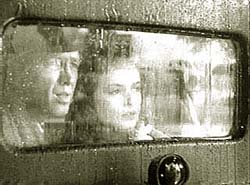If you ever believed in believing, Enchanted is a story so full of hope that you'll be glad you lost your magical thinking so that you can remember it fondly throughout this movie.
Great set-up and exposition
Plunging headlong from familiar fairy tales (principally Cinderella by way of The Princess Bride) Giselle (the perfect Amy Adams) meets her destined true love and Prince (James Marsden) and they pledge to marry tomorrow. But his mother is the evil Queen Narissa who'll lose her crown when her son, Prince Edward, marries.
Turning Grimm, the Queen lures Giselle to a deep well and pushes her to a fate worse than death – launched from a three-dimensional manhole in the 21st century Times Square. If that’s not shock enough, wait ‘til she sees the price of hotels! Giselle wanders the neighborhood looking for someone who’ll help her until she sees a billboard for a theme restaurant, The Prince’s Castle. She cannot understand why no one will answer the 2-D door. Enter our reluctant protagonist, Robert Philip (Patrick Dempsey).
The set-up and exposition in which the audience learns who loves and hates whom among the cartoon characters breathlessly unfolds thanks to cultural memory. We all know Cinderella and a couple other rags to riches romances. As Rossio and Elliot sagely say, beware the story that no one knows. First the screenwriter has to educate the audience, then she has to tell the story, and together they take a lot of time.
The second act that won’t make you think about refilling that giant drink
The second act – so often, sigh – is the wasteland where story focus and entertainment die a slow unwatchable death. Not Enchanted. Though we have no doubt where the story is going, the obstacles facing Robert and Giselle, force their stories to converge. Robert tries to get rid of Giselle; she can’t resist teaching him how to win his girlfriend. But in a spectacularly winning scene, Giselle confronts Robert. He’s negative. Always. They shout “NO,” at each other until she realizes she’s angry, which of course means she’s in love. Thank you, Amy Adams, for single-handedly making that scene work. And that’s the midpoint, because what was two parallel stories about getting back to the status quo turns into a love story.
Drama swallowed by evil dragon in the third act
Things go off the rails when the wicked queen reappears in the third act. Seems like the real evil in the real world would be the burden of familiarity. But, no. The fairy tale evil for Robert and Giselle threatens in the form of the transformed Queen, now a giant lizard, namely Susan Sarandon. She returns to steal Robert from Giselle. Why? Evil, I suppose, but certainly not for reasons made clear in this CGI sequence.
Honestly, at this point, so little made sense about the final conflict that I completely lost interest. Some stuff happened: on a rainy rooftop, Giselle rescues Robert and slays the dragon, both nearly fall to their deaths, over which the Queen natters about the story. Seriously, wherefore this meta-comment rather than dialog directed at her victim. Why not dramatize? Okay, screenwriting is hard. I sympathize with the choices that led to these conclusions. Turning Giselle into the dragon-slayer is a nice touch. And they must live happily every after. Blame the director or CGI or the weak performance by Sarandon (was it just me, or was the terrific actress phoning it in?), but somebody let us all down.
Innocence is good
Finally, I want to praise the movie for it’s unapologetically wishful tone of possibility. We all have to lose our innocence, but this movie should make you nostalgic for it. Save those rotten tomatoes labeled “arrested development” aimed at me. I’ve praised Knocked Up and relished Team America: World Police. This thing is full of clever storytelling.
By setting the rules of the story in cartoon fairy tales, the demands of believability are reframed as “everything believable in childhood tales can happen here.” So when the incredible, but archetypal, characters are exiled to our world, we feel affection for Giselle while we question whether she can steer by her fairy tale compass. Buoyed up on this a good-hearted hoot, it’s worth a second thought at this time of year. It worked for Giselle. Maybe we can all try a little harder to believe in love, regardless the opposition.
Friday, November 30
Wednesday, November 21
Dan in Real Life
After being misled by The New York Times review, I recommended "Dan..." to my in laws. "Awesome," they said. When folks get an emotional charge out of a movie, I see it. What do they know? Anyhow? Usually, more than me.
A.O.Scott did such a good job pointing out the movie's charming and unexpected beats:
Dan starts out so well. A widower and advice columnist, Dan is less confident raising his three daughters than he is answering other parents' questions. He loves his girls and they test him. So far, pretty real. Dan's goal? To protect his daughters from the worst blows of growing up. We love him for that. He and the girls head to the family lake for the annual reunion and ritual of closing it for the season.
Mopey and just bad company, his mother throws him out the next morning for a little alone time. He meets Marie (Juliet Binoche) in a bookstore and all at once he feels something like love. With it, the weight of being a widower and besieged father lifts. But when he gets to back to the family cabin, he meets Marie again, his brother Mitch's girlfriend. The story quickly turns into Dan's reluctant but sure pursuit of Marie and the problem of what to do about their infatuation once he knows she returns his feelings. His family looks primed to become the barrel of monkeys that will get in his way, but they are sweet, gentle, and sometimes knowing. Mitch is dense and forgiving, mostly.
Dan's three daughters, the other women in his life, would seem to be the source of his inner conflict over whether to give up his responsibilities and seize the chance for love again.. But he's so busy keeping the secret of his infatuation with Marie from his brother and the family, that the girls are reduced to (pretty funny) noise in three registers. If Dan really was dedicated to his daughters, the ease with which he lets go of that responsibility makes him a shallower character. And he stays that way to the end.
The lesson: The protagonist's goal in the first three scenes must be his goal throughout, unless it's pried from his hands with difficulty. Dan's second act arc is admitting that he loves Marie despite the secrets and inopportune timing. But the arc we wanted was to watch him struggle to choose between his love for his daughters and romantic love with Marie.
A.O.Scott did such a good job pointing out the movie's charming and unexpected beats:
The characters are funny not just to us but also to one another. Like most people, they use humor as a means of communication and self-defense, which gives the movie a genial, unhurried, lived-in feeling....that I missed his complaints:
"The story and the characters do wear a little thin in places. ...exactly who Marie is, apart from the embodiment of wonderfulness, is never quite clear. Nor is it entirely plausible that she would fall for both the dim, genial Mitch and the cerebral, uptight Dan.
"Dan, like many characters played by Mr. Carell, has the curious quality of seeming to be more complicated than he really is."Doesn't matter what A.O. Scott and I think. The movie's going to do box office.
Dan starts out so well. A widower and advice columnist, Dan is less confident raising his three daughters than he is answering other parents' questions. He loves his girls and they test him. So far, pretty real. Dan's goal? To protect his daughters from the worst blows of growing up. We love him for that. He and the girls head to the family lake for the annual reunion and ritual of closing it for the season.
Mopey and just bad company, his mother throws him out the next morning for a little alone time. He meets Marie (Juliet Binoche) in a bookstore and all at once he feels something like love. With it, the weight of being a widower and besieged father lifts. But when he gets to back to the family cabin, he meets Marie again, his brother Mitch's girlfriend. The story quickly turns into Dan's reluctant but sure pursuit of Marie and the problem of what to do about their infatuation once he knows she returns his feelings. His family looks primed to become the barrel of monkeys that will get in his way, but they are sweet, gentle, and sometimes knowing. Mitch is dense and forgiving, mostly.
Dan's three daughters, the other women in his life, would seem to be the source of his inner conflict over whether to give up his responsibilities and seize the chance for love again.. But he's so busy keeping the secret of his infatuation with Marie from his brother and the family, that the girls are reduced to (pretty funny) noise in three registers. If Dan really was dedicated to his daughters, the ease with which he lets go of that responsibility makes him a shallower character. And he stays that way to the end.
The lesson: The protagonist's goal in the first three scenes must be his goal throughout, unless it's pried from his hands with difficulty. Dan's second act arc is admitting that he loves Marie despite the secrets and inopportune timing. But the arc we wanted was to watch him struggle to choose between his love for his daughters and romantic love with Marie.
Labels:
Dan in Real Life,
Peter Hedges
Subscribe to:
Posts (Atom)


